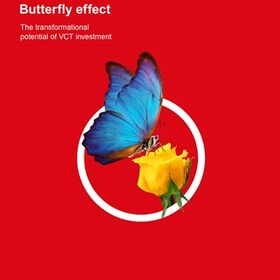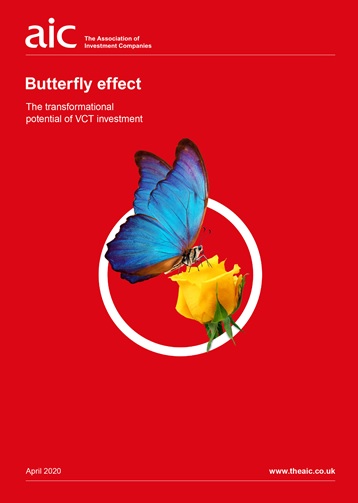New report reveals VCTs' focus on high-growth innovative businesses
'Butterfly effect' surveys VCT investment since 2017 rule changes.

 The Association of Investment Companies (AIC) today released a new report, Butterfly effect: The transformational potential of VCT investment. The report surveys investment by venture capital trusts (VCTs) since November 2017 when new rules were introduced directing the tax-advantaged vehicles towards higher-risk investments1.
The Association of Investment Companies (AIC) today released a new report, Butterfly effect: The transformational potential of VCT investment. The report surveys investment by venture capital trusts (VCTs) since November 2017 when new rules were introduced directing the tax-advantaged vehicles towards higher-risk investments1.
The report finds that VCTs have invested in over 181 innovative businesses with high potential for growth since November 2017. VCTs are able to invest in businesses with up to 250 employees: however, these businesses employ an average of 38 people each and nearly half of them (45%) have fewer than 25 employees.
These dynamic small businesses generated £395m of sales in 2019 of which £126m were exports. However, no company in the survey reported sales of more than £5m for the last financial year.
Knowledge-intensive companies2made up 28% of the 181 businesses in the survey, and 37% of VCT investment was directed outside London and the South-East. The report contains 25 case studies of companies that have received investment since the 2017 rule changes.
The AIC today also published the amount of money raised by VCTs for the 2019/20 tax year. The sector has raised £619 million for investment in small businesses. Whilst this is lower than in 2018/19 reflecting the uncertainty and disruption caused by COVID-19 it demonstrates continued strong demand for VCTs. A table of historic VCT fundraising is included below.
Ian Sayers, Chief Executive of the Association of Investment Companies (AIC), said: “Whilst this report was prepared before COVID-19 reached the UK, it demonstrates how VCTs are supporting many of the UK’s most innovative smaller companies with high potential for growth in sectors as diverse as healthcare, retail and green technology. VCTs offer an effective way of bridging the finance gap for young companies and the UK stands to reap significant benefits by continuing to nurture an environment where small businesses can grow and thrive.
“The £619m raised by VCTs over 2019/20 demonstrates that demand for VCTs remains high, despite the uncertainty caused by coronavirus. VCTs celebrate their 25th anniversary this year and the businesses they back have the potential to deliver important economic and social benefits, from exports and increased tax take to innovative technology and jobs.”
Key findings of the report:
- VCTs have invested in 181 businesses3 since November 2017.
- £395m of sales were generated by these 181 businesses in 2019, of which £126m (32%) were exports.
- 38 people are employed per investee business on average. 45% of the businesses have fewer than 25 employees.
- VCTs invested more than £900m in small UK companies during 2018 and 2019.
- 37% of VCT investment since November 2017 was outside London and the South-East.
- 28% of investee businesses are knowledge intensive.
- 62% of investee businesses reported sales in the last financial year – each of less than £5m.
- 56% of investee companies spent a total of £131m on research and development eligible for tax credits.
Historic VCT fundraising excluding enhanced share buy-backs
|
Tax year |
Fundraising (£millions) |
|---|---|
|
2019/20 |
619 |
|
2018/19 |
731 |
|
2017/18 |
728 |
|
2016/17 |
542 |
|
2015/16 |
457 |
|
2014/15 |
429 |
|
2013/14 |
420 |
|
2012/13 |
269 |
|
2011/12 |
267 |
|
2010/11 |
354 |
|
2009/10 |
338 |
|
2008/09 |
154 |
|
2007/08 |
220 |
|
2006/07 |
267 |
|
2005/06 |
779 |
|
2004/05 |
505 |
|
2003/04 |
50 |
|
2002/03 |
65 |
|
2001/02 |
125 |
|
2000/01 |
433 |
|
1999/2000 |
270 |
|
1998/99 |
165 |
|
1997/98 |
190 |
|
1996/97 |
170 |
|
1995/96 |
160 |
For more information on VCTs, visit www.theaic.co.uk or view the AIC’s guide: Going for growth
-Ends-
Follow us on Twitter @AICPRESS
Notes
- Significant changes to VCT rules were introduced in the 2017 Budget. These added a ‘risk to capital condition’ for new VCT investments to qualify for income tax relief. The condition ensured that VCT investment would focus on businesses which were taking substantial risks with a view to delivering high growth. The rule changes also restricted VCTs’ use of debt financing, increased the proportion of VCT funds that must be held in qualifying companies from 70% to 80%, and doubled the amount VCTs could invest in a knowledge-intensive company from £5m to £10m annually. Changes were also made to VCT rules in 2015, limiting the age of investee companies to a maximum of seven years in most cases and prohibiting VCT investment in MBOs.
- Knowledge-intensive companies are a subset of companies that qualify for VCT investment, and receive special treatment under VCT rules. They must meet conditions related to spending on research and development, employing highly-qualified people and/or developing intellectual property.
- The survey data records investments made by participating VCT management groups. Please see the acknowledgements section of the report for details.
- The survey period covered investments made after 4 December 2017 to November 2019. It may not capture all investments made as submission dates for data varied.
- All the financial data in the report is based on the most recently available audited report and accounts. Exceptionally, some information may be provided from the most recent management accounts.
- The Association of Investment Companies (AIC) was founded in 1932 to represent the interests of the investment trust industry – the oldest form of collective investment. Today, the AIC represents a broad range of closed-ended investment companies, incorporating investment trusts and other closed-ended investment companies and VCTs. The AIC’s members believe that the industry is best served if it is united and speaks with one voice. The AIC’s mission statement is to help members add value for shareholders over the longer term. As at the end of February, the AIC had 362 members and the industry had total assets of approximately £196 billion.
- Disclaimer: The information contained in this press release does not constitute investment advice or personal recommendation and it is not an invitation or inducement to engage in investment activity. You should seek independent financial and, if appropriate, legal advice as to the suitability of any investment decision. Past performance is not a guide to future performance. The value of investment company shares, and the income from them, can fall as well as rise. You may not get back the full amount invested and, in some cases, nothing at all.
- To stop receiving AIC press releases, please contact the communications team.







